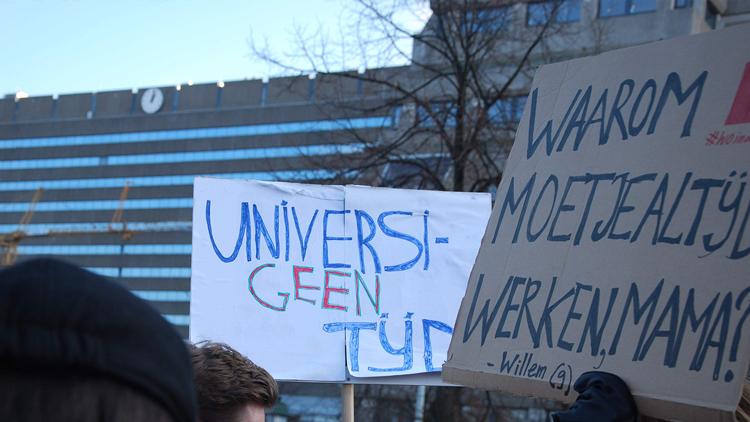Labour Inspectorate criticises UU’s policy
UU's handling of work pressure and inappropriate behaviour falls short

UU has no insight into the number of hours its academic staff work. Due to this, the university is violating the Occupational Health and Safety Act, as can be read in the report.
Moreover, according to the Labour Inspectorate, the university does not have a clear picture of the causes of structural overtime and the perceived work pressure. It also cannot prove to address the issue systematically. Much the same applies to countering workplace discrimination. Partly because of this, it’s unclear whether the measures taken by the university are effective.
A perfect match nationwide
UU’s administration sent the Labour Inspectorate's partial report to the UU Council last week. A general report by the inspectorate on the policies of all Dutch universities was already published in mid-May.
Back in 2020, the Labour Inspectorate had asked universities to draw up plans to combat excessive work pressure and inappropriate behaviour following complaints from the protest movement WOinActie. Last year, inspections were carried out into whether the universities had indeed started to address these issues. Policy documents were studied, interviews were held and staff was questioned for this purpose.
The findings of the investigation at UU almost perfectly match what the Labour Inspectorate found nationwide: university employees are suffering massively from high workloads and inappropriate behaviour, and institutions are failing to do anything about it.
"An extreme amount of work"
The results from a survey of 1,041 UU scientists also roughly match the national picture.
Some outcomes from Utrecht:
- 79 per cent think people have to work "extremely hard" at the university
- 40 per cent think there is "an extreme amount of work" to be done
- 75 per cent suffered from stress "more than incidentally" in the past two years
- 33 per cent have an increased risk of burnout
- 56 per cent have too many tasks
- 58 per cent structurally overwork
- 39 per cent have suffered from bullying behaviour
- 31 per cent are victims of "scientifically-related inappropriate behaviour"
- 59 per cent cite power differences and dependence as a cause of inappropriate behaviour
Measures against work pressure
The Labour Inspectorate acknowledges that UU has taken numerous measures to prevent work pressure and discrimination in the workplace. However, their effectiveness and reach are hardly measured. Whether the Recognition & Appreciation programme is already leading to less emphasis on research performance and more appreciation for teaching tasks is also still difficult to determine
Moreover, the inspectorate wonders whether the extensive care structure with confidential counsellors, ombudsmen, contact persons etc is not too complicated. Do staff know when to turn to whom, the inspectorate wonders.
The survey also examined whether UU employees are familiar with the various UU measures and whether they think they would benefit from these measures. According to respondents, the best-known measure is the meeting and email-free week. Almost 80 per cent of the respondents know that UU has such a week several times a year. Least known is 'GoodHabitz', an online platform for training courses on inclusiveness and good leadership.
The most appreciated measure is the appointment of more permanent UDs for which the UU allocated 50 million euros. The Labour Inspectorate also praises this investment in its report as a measure that for once does not rely on individual-centred symptom relief. Respondents have the least faith in Work Stress Week.
Recommendations
One of the recommendations for UU given by the Labour Inspectorate is to pay more attention to work pressure, discrimination, and workload, or 'psychosocial workload', in the risk analyses that faculties and departments make for the health and safety of employees. There should also be more research into preventing and reducing work-related stress within the organisation
The Labour Inspectorate announced it will conduct so-called enforcement inspections of the 14 universities in 2025. If the institutions do not show improvement by then, fines may follow.
Executive Board reacts
In a response posted on the Intranet (only accessible with Solis ID, Ed.), UU President Anton Pijpers already addressed the findings of the Labour Inspectorate last month: "The report confirms that improving social safety and reducing work pressure needs our continuous attention," he said. "A safe and pleasant working environment is a prerequisite for working and studying well at Utrecht University."
Pijpers mentions several measures UU has taken to address the issue. He too refers to the millions invested in permanent positions, but also to the new policy to make clearer choices in which projects the university does and does not want to tackle.
As for dealing with inappropriate behaviour, he thinks that this should mainly be the subject of workplace conversations. UU’s administration hopes to foster those conversations. "'Together' proves to be a key concept in creating a safe environment time and again."
Adjustment of the occupational health and safety plan
Following the report of the Labor Inspectorate, the university's annual health and safety plan was also adjusted, partly at the insistence of the University Council. The new version shows that greater efforts are being made to tackle socially unsafe situations. This is done, among other things, through the use of team coaches. It is also the intention that major dialogue sessions on the theme will be held within the university this autumn.
Professor Naomi Ellemers has been commissioned to conduct research into the most important measures included in the occupational health and safety plan. In this way, the UU also hopes to be able to prove that it is tackling the problem in a well-thought-out and systematic manner.